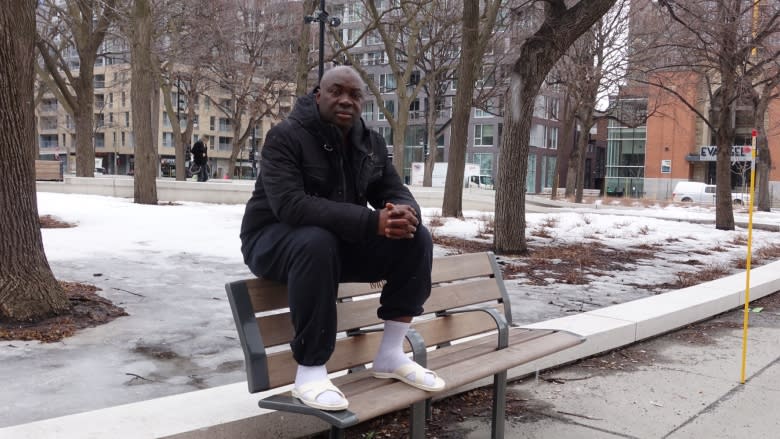Asylum seeker reunites with RCMP officer he says saved his life
A month after a near-fatal trek through the forest into Canada, an asylum seeker was reunited today with the man he says saved his life: RCMP Const. Bernard Vandal.
Vandal found the 45-year-old man on the side of the road in Quebec near the Canada-U.S. border on March 5, after he had walked for hours when the temperature reached –15 C.
Mamadou, whose family name is being withheld for his safety, suffered from hypothermia and frostbite, Vandal said, and spent a week in hospital recovering from the ordeal.
On Thursday, the pair met again and shared a hug — and relived the drama of that night.
"Thank you for saving my life," Mamadou told Vandal when they met.
The meeting took place at the RCMP's Montreal headquarters, at an event arranged by the Mounties.
An RCMP spokesperson said the police service decided to organize the reunion after learning that Mamadou wanted to meet the officer who saved him.
Life and death
Vandal said he came across Mamadou by chance while on night patrol.
He recalled how, when he spotted Mamadou standing by a fence near Lacolle, Que., on the side of the road, the Ivorian man had trouble speaking and could barely move his legs, which were like a "block of ice."
Vandal said it quickly became clear Mamadou needed emergency medical care. Vandal said he's convinced that if he hadn't found him, Mamadou would have died.
One of the RCMP officers to arrive at the scene was Const. Richer Dubuc, a trained paramedic, who Vandal said helped to treat Mamadou before he was taken to hospital.
Dubuc died a day later in an unrelated accident, when his RCMP squad car collided with a farm tractor. Vandal presented Mamadou with a photo of Dubuc.
"The moral of the story is that life is short, and when we can save a life, we will," Vandal said.
U.S. border pact flawed, critics say
Mamadou's case has attracted the attention of lawyers and human rights activists, who say it points to problems with the Canada-U.S. border pact.
A day before crossing the border illegally, Mamadou tried to make a refugee claim at an official port of entry into Quebec but was refused.
Under the 2004 Canada-U.S. Safe Third Country Agreement, asylum seekers who have landed in either the U.S. or Canada may not seek refuge in the other country at official entry points.
They can still, however, make a refugee claim after crossing illegally — as an increasing number have done in recent months — but only if they haven't tried at a legal crossing first.
For that reason, Mamadou is not eligible for refugee status in Canada.
Future in Canada uncertain
For now, Mamadou is living at the YMCA residence in Westmount, near downtown Montreal, where many asylum seekers stay when they first arrive in Quebec.
He was released on conditions from the Laval, Que., detention centre late last month.
His lawyer, Éric Taillefer, is considering challenging the Safe Third Country Agreement in Federal Court, as a way to keep his client in Canada.
Mamadou said he left New York City, his home for the past 10 years, after immigration officers came looking for him in his Bronx apartment.
He had been living with uncertain legal status in the U.S. after fleeing Ivory Coast, where he said he witnessed rebels fatally shoot his father, a prominent businessman in Abidjan.
He said he fears he will be killed if he is forced to return to his home country.
He is hoping to work as a taxi driver if he finds a way to make a refugee claim and is allowed to stay.
- IN DEPTH: Mamadou's nightmare: One man's brush with death crossing the border



